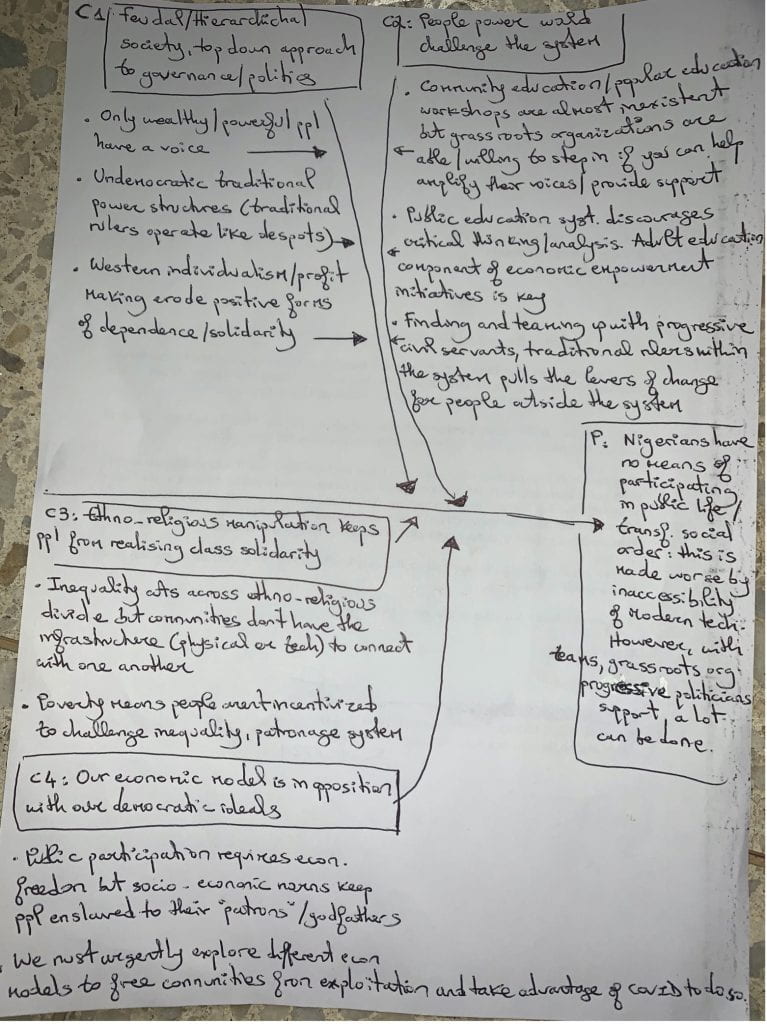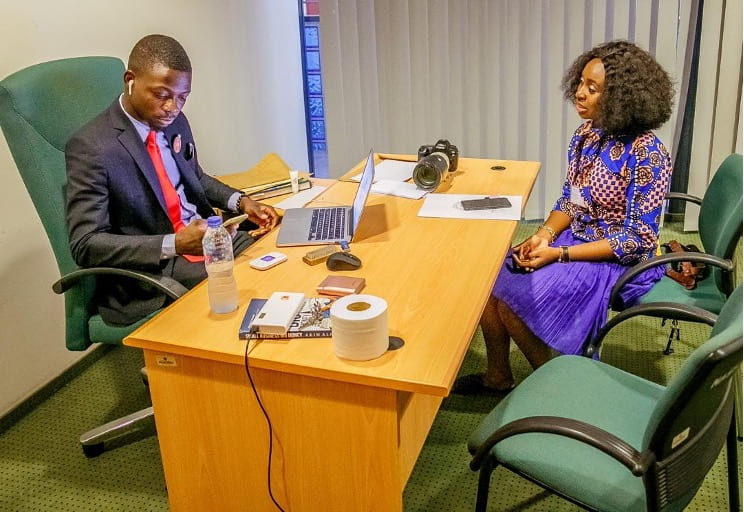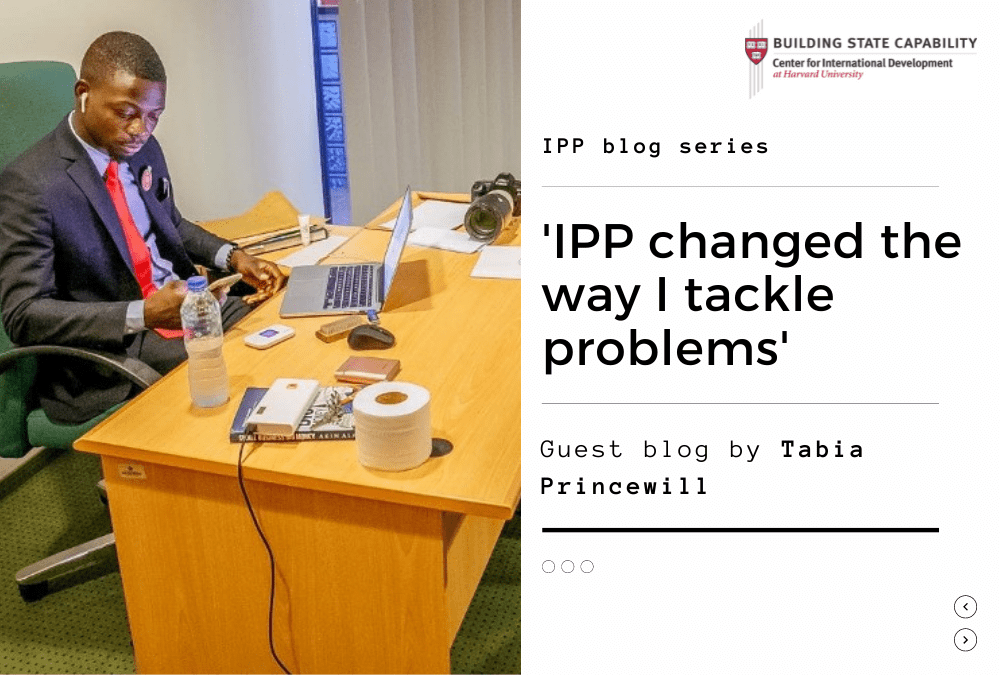Guest blog by Tabia Princewill
As a Special Assistant to the Speaker of the House of Representatives in Nigeria, I have experience working in a large, complex bureaucracy and I decided to take this course to learn how to deliver results within a space where state capability has been weakened over the years and where competing political interests often negatively impact the organization’s capacity to produce positive outcomes. I came into the course with a number of assumptions about who holds authority within a structure and I was happy to learn how to challenge traditional notions about the usefulness of top down approaches as well as plan and control methods. My expectations were thus met and mostly surpassed: our supportive team of instructors made learning thought-provoking and fun drawing from global examples of building state capability.
This IPP journey was the unexpected deus ex machina which enabled me to remain productive and hopeful during the COVID 19 pandemic. Despite these unprecedented and incredible circumstances, I gained a real boost by absorbing new tools and perspectives. Some key learnings for me were the “4Ps” (perception, projection, people and process) because this helped me deeply connect with the core of what I needed to do: disappoint political elites at a rate they can absorb and enable a more inquisitive mindset in my work environment so that new stories, new viewpoints and narratives can be heard, instead of the usual practice of allowing ourselves to be locked into one fixed way of thinking.
I was particularly inspired by the notion of teaming, bringing different people to the table who are neither used to being in the same room (due to status differentials for example) or collaborating. Hearing from such a diverse team proved to be a fascinating experience and a true challenge to the culture of hierarchy where the opportunity to speak up is fiercely guarded. I also learnt the importance of being more “relational” (building good relationships is an important strategy), and building trust and empathy at various levels within my organization and across sectors. “Learning and leads”, i.e. the idea that the more we learn about our challenge and its root causes, the more we gain the ability to tackle it via the new contacts and connections we made revolutionized my thinking. Through this course I was able to build new relationships which unlocked new concepts and understanding: I was able to see my colleagues in a different way by focusing less on advocating for my own views and simply listening to their own perspectives. I thus found allies in surprising places and made lasting discoveries about the lived experience of a diverse set of citizens. Teaming up with people helped me to develop a broader understanding of issues and all that was unknown about my challenge became less daunting precisely because I had a team to share my experiences with. The “aha” moments really came out of the realization that small wins are more sustainable than big wins (which don’t happen as often as one would like or imagine). Small steps, learning as you go along, the very concept of iterations, the back and forth business of adaptability and flexibility was simply mind blowing. All in all, PDIA, constructing and deconstructing a problem, identifying entry points and searching for solutions enabled me to take action, learn, review and try again. This “learning by doing” approach encouraged me to experiment, to ask “why” and to imagine what the problem would look like if it were solved, allowing me to not only dream that it is possible to do things differently, but explore this idea in concrete terms, despite existing institutional bottlenecks.
Regardless of the propensity, in my local context, to prioritize the voices of those at the top of the social pyramid, I found there is actually a lot more hidden authority at the bottom and that to tackle dysfunction, it is very useful to empower the lower rungs of the ladder, thus allowing new views on old problems to emerge. This has been the basis of my policy challenge: strengthening local communities’ ability to participate in public processes. With support from this course I was able to find new ways of engaging outside of the usual patronage systems. Ordinary Nigerians have no means of participating in public life but by harnessing modern technology, teaming across sectors, bringing together grassroots activists, progressive politicians and local groups, it is possible to build issue-based coalitions to challenge the status quo. Engaging with such a diversity of people has been a joyful and enriching experience. I’ve been challenged to grow my own personal authority in ways I couldn’t have predicted, I’ve experienced personal growth by celebrating small wins and taking small steps which have all added up and served to achieve something great. I’m pleased to say that this course has enabled me to develop meaningful, tailor made solutions to local challenges.
My greatest insights into my challenge came from engaging new sources of know-how across public and private sectors: asking for people’s opinions, rather than keeping to assumptions or pre-conceived notions, enabled me to build a supportive team inside and outside government working towards the same goal, giving ordinary people a voice in policymaking and furthering the objectives of legislative advocacy. I thus learnt that ultimately, the structural issues within the Nigerian federation predetermine citizens inability to effectively participate in politics. Public so-called disinterest in policymaking thus comes down to the system actively making it more difficult for people who aren’t well connected to participate or have any influence. Some progress was made however, given the number of webinars and town halls we were able to organize despite the pandemic acting as a limiting factor. Realizing that implementation of legislation requires us to engage with many more authorizers than we bargained for was another important milestone as coordination between state and federal actors was sometimes difficult to achieve. However, through the conference of speakers, we were able to bring people together to discuss local and national issues. Citizens were eager to participate and it was a good opportunity for me to practice “active listening”. I met incredible people doing amazing work and it was also a pleasure to connect them to each other. My resolve was tested in many ways but I stayed the course by focusing on the results: people were dialoguing in new ways. I came across a number of deeply entrenched interests and met a number of beneficiaries of the current system and each iteration unlocked new understanding of why or how the system came to be gridlocked in the first place. Bringing government closer to citizens is fundamental if we want a truly open, democratic society but a number of powerful people are indeed opposed to this. Here is my fishbone challenge on the floor of the office of a grassroots organization I shared it with:


Introducing a colleague to some of the new ideas I learnt
At a roundtable discussion with civil society groups on how to support Internally Displaced Persons’ access to public services and the necessity of engaging them

The way I tackle problems has definitely changed, due to this course. By identifying causes and sub causes of problems I was led to find new points of engagement and thus saw openings where change, no matter how small, could be achieved. This was very motivating: it showed me possibilities and forced me to think through whether or not my organization was ready for the ideas and reforms I had in mind and IPP equipped me to have a better narrative for authorizers to explain the “why” and get buy in. It was also interesting to see that the citizens were often miles ahead of politicians in that regard. Going forward, I’ll be sure to tackle complex problems by tapping into diverse networks of knowledge and understanding, learning from their different views and approaches. I have been taught to see problems as opportunities for change: it’s a fresh and rewarding mindset.
PDIA is a method and a toolkit which I’ll carry with me and continue to advocate for. In a complex, multi-ethnic, politically charged country such as Nigeria, there are no easy answers and one must embrace flexibility and fluidity as we untangle longstanding policy issues. I’ll continue to build my authority, acceptance of my ideas and ability to experiment with alternatives, something a lot of people are not comfortable doing. There are no easy solutions and every time I meet and engage with authorizers who are willing to entertain new learnings, that’s a win.
My advice to PDIA practionners: keep refining communication strategies to convince authorizers; show them in clear terms what the problem is and ultimately why they should care if it’s not immediately apparent. Help them to gain confidence in your capacity to pull off experimental iteration and to grow confident with the unknown and unexpected which will surely come up. Always celebrate your wins (it’s very motivating for teams) and remember that legitimacy doesn’t necessarily come over night.
This is a blog series written by the alumni of the Implementing Public Policy Executive Education Program at the Harvard Kennedy School. Participants successfully completed this 6-month online learning course in December 2020. These are their learning journey stories.
Learn more about the Implementing Public Policy (IPP) Community of Practice and visit the course website to apply.
